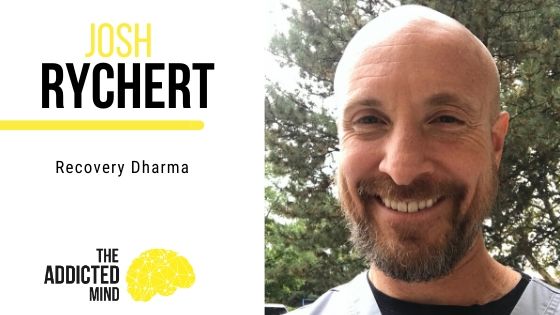Josh is in Boise, Idaho, where he has been involved in the recovery community since 2014. Recovery Dharma, under that name, only came into being last year. Recovery Dharma in Boise started as Refuge Recovery, with small groups and alliances with other similar groups through an online presence.
Recovery Dharma is an addiction recovery peer support group, with meetings all over the nation. It uses Buddhism, with the Four Noble Truths and the Eightfold Path, as a way to structure recovery for individuals.
Josh’s recovery began in 1995. After having had issues with an alcohol use disorder, he became involved with Twelve Step groups. And after many years of recovery, Josh eventually found himself moving away from the Twelve Steps and developing an interest in meditation, to help his depression. Eventually, he rediscovered his need for a recovery community, and he fell into the Buddhist addiction recovery path, under the name of Refuge Recovery.
Buddhism was something that recognized Josh’s capacity to have a life where compulsions and addictions were not the primary focus. It offered him an opportunity to identify with a recovery path that didn’t identify with his addiction. He could, however, still recognize the risk of compulsions and addictions in his life.
The kind of present moment experience that Josh wanted from Buddhism was the experience of seeing the world clearly, being able to participate in life, and simply being alive and happy. While recognizing, at the same time, that he had certain risks to his wellness.
Buddhism offers a spiritual path, it uses mindfulness and meditation, and it recognizes addiction as a risk. It addresses the recovery from addiction as what is happening in one’s life in the present moment, as it is being lived, rather than having a focus on the past, and an identification with a set of behaviors to retain recovery. After the initial concerns with a compulsive or addictive behavior have been addressed, it’s about living life and knowing that there is a tendency for that kind of behavior. Present moment awareness is where the ability to stay in recovery is exercised.
For most people in recovery, options are not offered to them in the beginning. People with addictions are usually referred directly to Twelve-Step-based recovery programs, although many people don’t resonate with that.
Having Buddhism as an option is valuable because it recognizes a modern incarnation of our knowledge of recovery and it does not require reliance on a Higher Power.
Mindfulness has been scientifically validated. With cravings, mindfulness helps people to be with the discomfort, and sit through it. Also, when the cravings have lessened, mindfulness helps people to thrive, in the moment.
Recovery Dharma offers a way to learn about, and practice meditation, as a supplement to the Eleventh Step in the Twelve-Step Program.
Recovery Dharma is broken down into some general categories. There is the practice of meditation, there are recovery meetings, and there is the study of Buddhism.
Dharma is often the word used to describe the teachings of Buddhism. More broadly, it describes a sense of truth, or a clear understanding of reality, or the wise teachings that bring about in people a sense of well-being and an ability to connect with the world. It allows people to share their wisdom and it offers them a sense of togetherness.
The Recovery Dharma meetings facilitate a sharing of wisdom through engaging in a practice to build a sense of calm and equanimity.
The path of Buddhism provides structure and a more wholesome way of life for people in recovery. It also brings in the cultivation of compassion, forgiveness, and a sense of peace, equanimity, calmness, and presence.
After his initial experience with the Twelve Steps, Josh continued to feel like an outsider. He did not fit with the feel of the meetings and the program. So he moved away from it and, as a result, he lost the support of the group. But his life went on and he forgot about his problems with addiction. Over time, however, he developed a problem with the compulsive use of internet pornography. He did not enjoy the subtle undercurrent of shame around issues of sex within the Twelve-Step Program, and he realized that with the program, many of the issues around cross-addiction were being swept under the rug, and this often led to denial. This drew Josh towards looking for something that would address the underlying cause of his addiction.
Recovery Dharma is a branch of Refuge Recovery and it addresses the underlying causes of people’s addictions.
A book called The Mindful Way Through Depression, and The Cambridge Insight Meditation Center, in Boston, gave Josh a connection to a very solid Buddhist community. Through these connections, he developed a sense of what Recovery Dharma could represent for people in recovery, as an alternative to the Twelve-Step Program.
There’s a recognition within the professional community today, that Recovery Dharma, and the practice of meditation, are very valuable to people on the path of recovery.
Links and resources:
Recovery Dharma’s Facebook page – https://www.facebook.com/groups/recovery.dharma/
The Addicted Mind Website – www.theaddictedmind.com
For more info about Novus Mindful Life Institute, go to www.theaddictedmind.com/help
Join our Facebook group. Go to www.facebook.com, type in The Addicted Mind, and click ‘join’.
Book: The Mindful Way Through Depression by Mark Williams, John Teasdale, Zindel Segal, and Jon Kabat-Zinn

